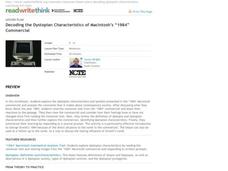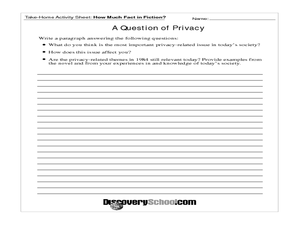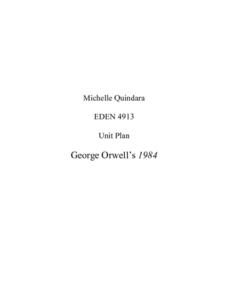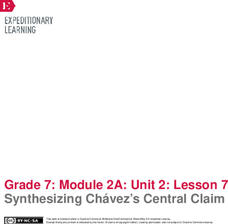ReadWriteThink
Decoding the Dystopian Characteristics of Macintosh’s “1984” Commercial
Known as one of the most iconic advertisements of the 20th century, Macintosh's "1984" commercial has become more of a social statement. Present the ad to a new audience of viewers with a lesson plan focused on identifying dystopian...
The New York Times
Big Brother vs. Little Brother: Updating Orwell's 1984
Government surveillance is an enduring conflict that has become increasingly complex with our nation's use of technology. Add to the understanding of Orwell’s 1984 by using the resources here that display the contemporary actions of Big...
Curated OER
1984: How Much Fact in Fiction?
Students compare and contrast the society in Orwell's 1984 with modern society. In this 1984 lesson, students research the historical climate in which Orwell wrote the novel. Students create a comparison chart of privacy issues in the...
Curated OER
1984, by George Orwell - Fact or Fantasy?
Students read 1984 by George Orwell. They research a country who has dictators similar to Oceania's leaders and create a outline for a paper. In addition, they create a web page from their information.
Curated OER
1984
Students read 1984, noting the potential dangers of government. They keep private diaries to parctice freedom of expression. They create political cartoons for a secret publication and design posters and T-shirts with warnings on them.
Curated OER
1984 by George Orwell
Readers of Nineteen Eighty-Four engage in a close reading exercise that directs their focus to the key details Orwell provides in the opening paragraphs to introduce his dystopian society. The included worksheeet is divided into three...
Curated OER
George Orwell's 1984
Eleventh graders engage in a literature study that is concerned with the strengthening of reading comprehension skills while they practice using context clues to arrange meaning to the text. The total assessments for this unit includes...
The New York Times
Literary Pilgrimages: Exploring the Role of Place in Writers’ Lives and Work
Do the places you have lived influence what you write? Class members research the lives of writers and look for how places these writers have lived might have influenced their writings.
EngageNY
Reading Closely: Introducing Chávez’s Commonwealth Club Address and Considering the Plight of the Farmworker
How can a persuasive speech help inspire social change? Scholars read along as they listen to the first half of César Chávez's 1984 speech, "Commonwealth Club Address." Next, pupils use graphic organizers to analyze one of Chávez's...
EngageNY
Reading Closely and Introducing Rhetoric Toolbox: Unions as Agents of Change—Part 1
Scholars explore the question of whether labor unions are the agents of change as they continue reading César Chávez's 1984 speech, "Address to the Commonwealth Club of California." They discuss rhetoric in Chávez's speech and discover...
EngageNY
Speech Structure: Unions as Agents of Change— Part 2
Scholars continue reading César Chávez's 1984 speech, "Address to the Commonwealth Club of California." Working with partners, they complete graphic organizers to determine a claim that Chávez makes about the UFW.
EngageNY
Mid-Unit Assessment: How Chávez Develops His Claims in the Commonwealth Club Address
Scholars complete a mid-unit 2 assessment, analyzing how César Chávez supports his claims in his 1984 speech, "Address to the Commonwealth Club of California." Learners focus on paragraphs 18 and 19 of the speech, answering text-based...
EngageNY
Speech Structure: Part 2 of the Commonwealth Club Address
Scholars continue reading and analyzing César Chávez's 1984 speech, "Address to the Commonwealth Club of California." Working with partners, they answer text-dependent questions about how governments and consumers affect working...
EngageNY
Synthesizing Chávez’s Central Claim
Class members play an interactive game, matching strips of paper containing rhetorical devices with examples from César Chávez use rhetoric in his 1984 speech, "Address to the Commonwealth Club of California." Next, partners discuss...
Curated OER
Book Report Activity
Students analyze language arts by reading a book in class. In this book report lesson, students must read one of five selected books including 1984 and Lord of the Flies. Students prepare a two page report and create a poster...
The New York Times
Evaluating Sources in a ‘Post-Truth’ World: Ideas for Teaching and Learning about Fake News
The framers of the United States Constitution felt a free press was so essential to a democracy that they granted the press the protection it needed to hold the powerful to account in the First Amendment. Today, digital natives need to...
PBS
Symbolism and the Use of “New Language” in The Handmaid’s Tale
Words matter. Words frame thought. Words are symbolic. Readers of Margaret Atwood's The Handmaid's Tale examine how the words In Gilead's "New Language" reinforce the power of the government and provided insight into the symbolic level...
Curated OER
Looking at Life through the Creation of Personal Metaphors
Students focus on the creation of personal metaphors, which are first illustrated in pictures and caricatures and then extended to descriptive/analytical paragraphs. They teach the lesson to others using their own personal metaphors as...
Curated OER
Identity: A Path to Self-Esteem
Sixth graders participate in a brainstorming activity in which they identify the types of decisions they make everyday. Individually, they complete a worksheet on making decisions effectively. After reading a poem, they identify the...
Learning to Give
Asian Folktales
A great way to learn to understand people and their environment is to study their folktales. Stories from China, Vietnam, India, Iran, Persia, and Palestine offer an opportunity for readers to investigate the cultures of Asia. A list of...
Curated OER
Winter Olympics History Year by Year
Investigate the history of the Winter Olympic Games. After researching this event and compiling necessary statistics, pupils use a graphic organizer to chart their findings. A template for a chart is included in this resource. Have your...
Curated OER
"Shooting An Elephant": George Orwell's Essay on His Life in Burma
High school readers examine George Orwell's essay "Shooting an Elephant" for examples of symbolism, metaphor, connotation, and irony. They analyze how these literary tools convey the writer's main point and contribute to the persuasive...
Curated OER
Using Primary Sources to Study the Holocaust
Engage your middle schoolers with Pastor Martin Niemoller's famous poem that begins, "First they came for the communists." Now that you have their attention, send learners to the various work stations you created to have them explore...
Curated OER
Stating Your Case: Writing Thesis Statements Effectively
As a writer, if you have a weak introductory paragraph or thesis statement, you might lose your audience! Have your middle and high schoolers practice writing introductory paragraphs that include clear thesis statements in response to...
Other popular searches
- George Orwell 1984
- Orwell 1984
- 1984 Novel Activities
- 1984 by George Orwell
- 1984 Movie
- 1984 Orwell Test
- Orwell 1984 Movie
- George Orwell 1984 Math
- 1984 Orwell Fun Lesson
- Rhetorical Devices in 1984
- Utopian Society 1984
- Orwell 1984 Lesson Plans

























